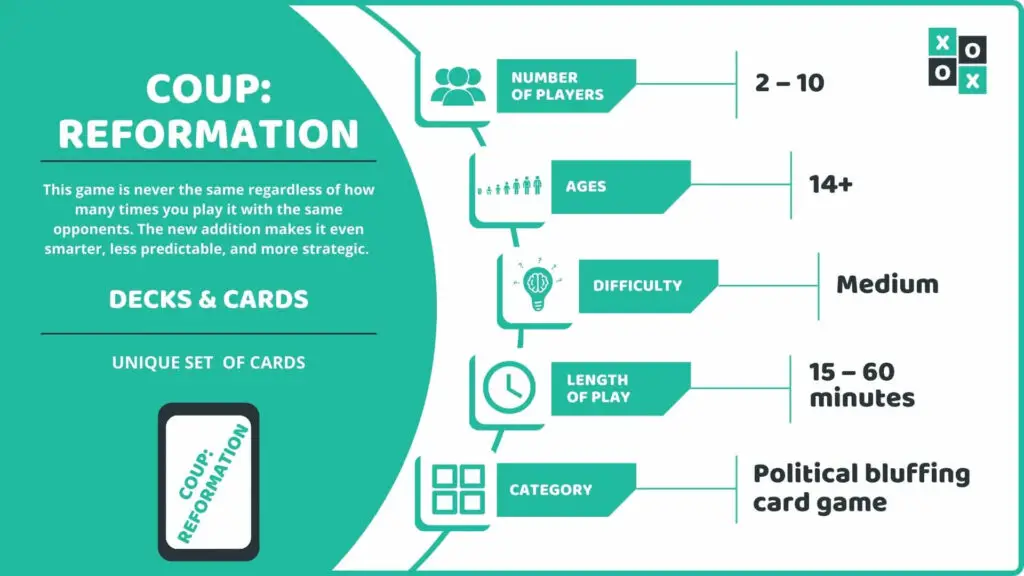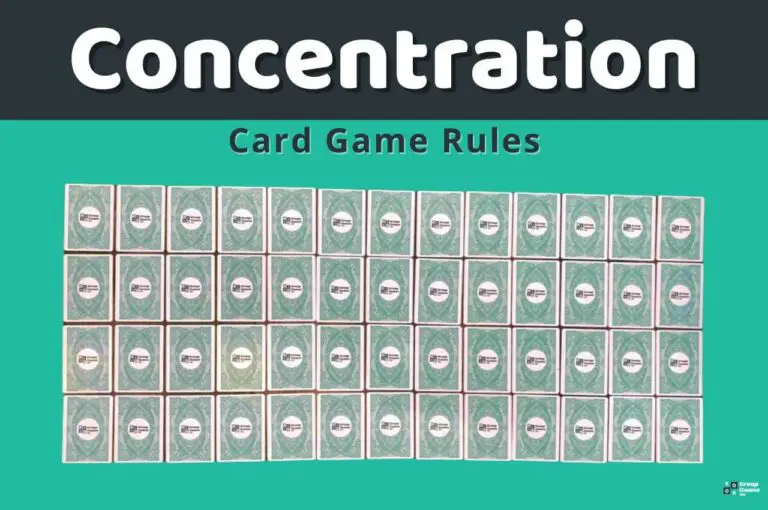Coup is an intriguing card game for those who feel confident in tactics and love to stay one step ahead of their opponent. These Coup: Reformation rules explain the gameplay of the newest expansion to this popular title.
Coup: Reformation was released in 2021 as an addition to the original version of Coup: City State by La Mame Games (check the original Coup card game rules).
It comes with a new set of cards that expand the game with new features and actions. Moreover, it makes the game more enjoyable for a larger group of players (see more big group games you could try).
This Coup: Reformation rules guide will cover the following:
- What is Coup: Reformation?
- What you’ll need to play Coup: Reformation
- Coup: Reformation rules
- How to play Coup: Reformation (video tutorial)
- FAQs
- Other similar games to Coup: Reformation (our guides)
Read on and find out how to play Coup: Reformation.
What is Coup: Reformation?

Coup: Reformation is a new chapter of the popular card game set in a dystopian future where powerful international entities took over governments’ roles and forced the masses to live in poverty – except for the few privileged.
The players are trying to seize total control and overpower their opponents by undermining their agendas and ousting them. The last one standing becomes a winner.
In the new chapter, powerful leaders face massive resistance from reformists with significant popular support. Some try to fight it; others try to take advantage of the latest trend. Still, only one can survive.
Number of Players: 2 – 10
Ages: 14+
Difficulty: Medium
Length of Play: 15 – 60 minutes
Category: Political bluffing card game
Similar to: Gaia Project, Resistance, Complots: Saint Barthélemy
Main Objective: Be the last player and seize all the power for yourself.
Why We Love It: This game is never the same regardless of how many times you play it with the same opponents. The new addition makes it even smarter, less predictable, and more strategic.
What You’ll Need to Coup: Reformation
Coup: Reformation is an expansion to the original Coup game.
The Coup card game set includes:
- 3 Duke Cards
- 3 Assassin Cards
- 3 Captain Cards
- 3 Ambassador Cards
- 3 Contessa Cards
- 6 summary cards
- 50 coins
AND
- Coup: Reformation expansion pack that contains:
- 10 allegiance cards
- 1 treasury reserve card
- 15 character cards
- 10 reference cards
- rulebook
Our tip: If you want to try another great title from the Coup family, try Coup– Rebellion, a thrilling spin-off version with 25 character cards instead of the standard 5.
Coup: Reformation Rules and Gameplay
Coup: Reformation is a relatively complex game, but it all becomes logical and straightforward once you get used to it.
Of course, it will be much easier for you if you’re already familiar with the original Coup game. The additional cards in Coup: Reformation adds some new features and actions, but the gameplay remains pretty much the same.
Here’s a summary of the differences introduced in this expansion pack:
Allegiance cards
Unlike in the original game, players now compete in one of two teams. This means that you cannot block, coup, assassinate or steal from someone from your own team.
Coup: Reformation contains an allegiance card for every player. It’s a double-sided card with a blue side (allegiance to Reformists) and a red side (allegiance to Loyalists).
Nevertheless, you don’t have to stick to a single team for the whole game, which adds more spice to the gameplay (we’ll get to all the details shortly).
Treasury Allegiance card
This new card serves as bank collecting fees from those who decide to change allegiances. As I’ll explain in a moment, there are several ways to use it.
Inquisitor Character
A new character serves as an optional replacement for the Ambassador. Inquisitor is quite similar to a weakened Ambassador. The main difference is that he can look at the opponent’s card and potentially drive them to discard it.
Extra Characters for more players
The expansion set also includes two additional examples of each standard character to accommodate more players.
Reference Cards
Ten double-sided reference cards are also new to the game. Five of them are for standard Coup: one side features Ambassador and the other Inquisitor.
The remaining five are designed for playing Coup: Reformation, integrating the novel actions of Embezzle and Convert and Embezzle. Again, these cards feature Inquisitor on one side and Ambassador on the other.
Starting the Game
Coup: Reformation starts just like a standard Coup game:
- Shuffle the character cards together and deal 2 of them to each player. These represent the people you can influence. Players can look at them, but they must keep them facing down constantly.
- Each player also gets an Allegiance card. These cards are dealt clockwise, alternating allegiance from player to player by turning the cards on opposite sides. The first player can choose.
(Remember that you can’t assassinate, coup, steal, or block a foreign aid from a player who has the same allegiance. The only exception is when everyone has identical allegiance. However, you can challenge these players.)
- The remaining cards are placed face-down on the table serving as the Court Deck.
- Place the Treasury Reserve card in the center of the table.
- Distribute two coins to each player. Money must always stay visible for all players.
- Hand out summary cards with references to all the players.
- Choose a player who will take his turn first (for example, it can be the youngest one).
How to Play Coup: Reformation
The gameplay continues more or less normally following the standard Coup card game rules:
- Each player must perform one action on their turn (passing is not allowed).
- Other players may challenge him or counteract him. In that case, the counteraction/challenges must be resolved before the game continues. The outcome is either success or failure of the initial action.
Here’s a summary of new actions introduced in the Reformation expansion pack:
Conversion
You can change your allegiance by paying one coin to the Treasury Reserve (place them on the card). Alternatively, you can also change another player’s allegiance by paying two coins. When you change allegiance, turn the allegiance card over.
Embezzlement
Any player can try taking all the coins from the Treasury Reserve – unless they have the Duke character.
- Other players may challenge the player based on a suspicion that he has the Duke. If that turns out to be true, the player loses and must concede. Besides returning all the coins, he also loses one of his influence cards.
- If the player does not have Duke (and won’t concede voluntarily), proving it by revealing their influence cards, the challenger loses. Revealed cards are shuffled with the court deck, and the player picks new cards randomly.
Variant ‘Inquisitor’
Inquisitor, a new character card in the Coup: Reformation expansion pack, lets you enjoy the game with slightly altered rules. To play it, replace all the Ambassador cards in the court with Inquisitor cards. The Inquisitor allows the following actions:
Exchange
If you want to exchange one of your cards, pick a new (random) card from the court deck. Then decide if you wish to proceed with the exchange, choose one of your face-down cards, and place it on the court deck.
Examine/Force exchange
Select an opponent that must show you one of his cards(except a player who shares the same allegiance). He will choose one of his face-down cards and reveal it to the Inquisitor. As an Inquisitor, you can decide to return the revealed card or force exchange.
In case of a forced exchange, the opponent picks one random replacement card from the court deck. The Inquisitor returns the selected card to the court deck instead.
Block stealing
Inquisitor can block any of his opponents from stealing as a counteraction.
Variant for up to 10 players
By including 4 or 5 of each of the selected character cards in the court deck, you can adapt Coup: Reformation for up to 10 players. Remember, though, that this will lead to considerably longer playtime, and players who were eliminated first may wait long for the round to end.
Coup: Reformation Scoring
Like the standard Coup game, Coup: Reformation is won by whoever maintains at least one of his character cards the longest. You can play the game as a tournament, scoring players for each victory (e.g., one point for winning with a single character card and two points for keeping them both).
How to Coup: Reformation – Video Tutorial
Coup: Reformation Frequently Asked Questions
Is Coup: Reformation the best Coup expansion?
Coup: Reformation is probably the best expansion pack if you’d like to play Coup with more players. Nevertheless, Coup: Rebellion G54 and Coup: Anarchy are also great additions to the original game, bringing in new features and fresh challenges.
Is Coup: Reformation stand alone?
You must first have the original Coup game before expanding it with Coup: Reformation. You can get the two in a bundle, though.
How long is a game of Coup: Reformation?
The game’s length depends on various factors, including the number of players, the frequency of challenges, etc. It can take anywhere between 15 minutes and several hours.
Other Similar Games to Coup: Reformation (Our Guides)
If you’d like to try some other similar games, check our guides to these Coup: Reformation alternatives:
- Saboteur rules
- Werewolf game rules
- Dragonwood rules
- Hanabi rules
- Onitama rules
- Risk board game rules
- Sheriff of Nottingham rules
- Diplomacy rules (guide coming soon)
- Hidden Agenda rules (guide coming soon)









